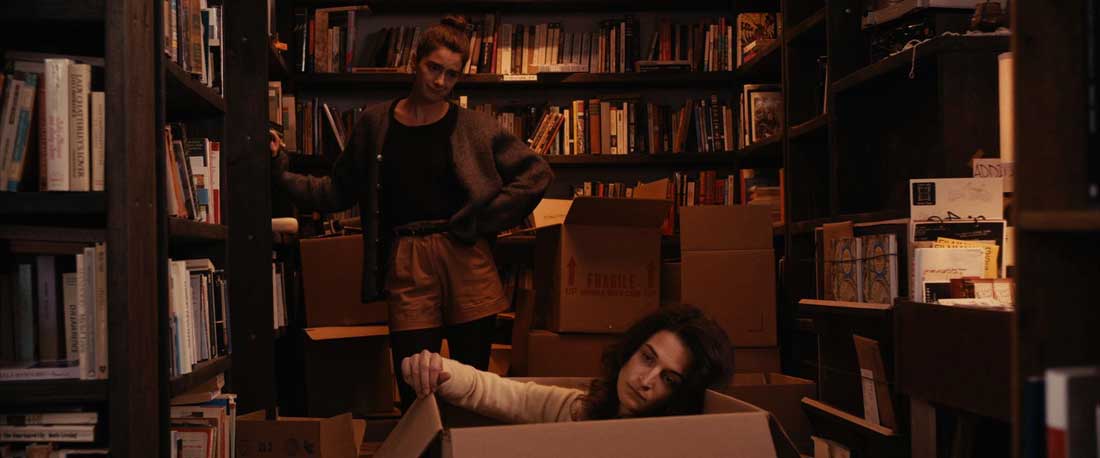Maybe you’ve heard Obvious Child referred to as “the abortion comedy.” Its makers have — rightly — argued that their work is much more than that. Nevertheless, abortion is what distinguishes the film from everything else that’s out right now. Most movies avoid the subject, and not just because filmmakers and studios would rather not deal with the thorny political, ethical, and religious issues that abortion tends to raise. It’s also because screenwriters, playwrights, novelists, and the like know how to handle childbirth as a story point. By contrast, many writers look at abortion and see a narrative dead end. So Jonah Hill coins the term “shmashmorsion” in Knocked Up while the pregnant woman never considers the topic. So we get that appalling scene in I Don’t Know How She Does It where Sarah Jessica Parker goes glassy-eyed and bullies her assistant into canceling her abortion. So the only movies that really treat the subject are anti-abortion screeds like October Baby and Doonby. And a whole facet of life gets ignored at the theater.
This is a lot of baggage for one unassuming, low-budget movie to bear, but it hardly seems to weigh at all on Obvious Child. Jenny Slate portrays Donna Stern, a 28-year-old New Yorker trying to hack it as a stand-up comic. She’s already something of an insecure mess before her boyfriend (Paul Briganti) tells her — in the middle of the comedy club’s crowded unisex bathroom — that he’s leaving her for her best friend. Her self-pity leads to a drunken night of unprotected sex with a relative stranger named Max (Jake Lacy). “I remember seeing a condom,” she says later. “I just don’t remember exactly what it did.” After her pregnancy tests come back positive, Donna makes an appointment for an abortion, which happens to land on Valentine’s Day.
This is an impressive feature debut for writer-director Gillian Robespierre, who based the movie on her own 20-minute short film, which also starred Slate. Donna’s resolve to have the procedure never wavers, so the movie’s dramatic tension comes from her waffling on how to tell the perfectly nice Max, who wants to date her. Rather than presenting the abortion as a traumatic, earth-shattering event, the movie handles it as something that causes Donna considerable short-term anxiety but no more.
True, Donna’s road would be much harder if she were living in rural Texas instead of New York City, but that’s not the story that Robespierre is out to tell. She trains the focus mostly on her protagonist’s state of mind instead of larger issues, and she keeps the tone determinedly light and nonconfrontational. The only exception is when Donna’s new best friend Nellie (Gaby Hoffmann) goes off on a rant about sexism in society and the unreasonable expectations placed on women. Their gay friend (Gabe Liedman) responds nicely: “Everything you’re saying is valid, but you’re scaring my dick off!”
That aside, I could have used a few more jokes that hit home, even though some of Donna’s early material is intentionally not as funny as it could be. There’s a bit too much filler, too, like the montage of Donna and Max drunkenly dancing in their underwear to the Paul Simon song that gives the movie its title or the scene where an older comic (David Cross) tries to seduce Donna. The movie would make a more powerful statement if it were just funnier.
Still, the former Saturday Night Live player Slate gives a fine performance, especially in a scene in the back of a taxi when Donna orders the cabbie to make a U-turn so she can go to her mom’s house and reveal her situation to her mom (Polly Draper). The movie climaxes with Donna using her stand-up set to come clean to Max and a roomful of strangers about her pregnancy and her plans to end it, and the scene is as compelling a stretch as any movie this year has pulled off.
I’ve never had an abortion, nor has anyone close to me that I’m aware of. Still, I sense that Obvious Child is closer to the messy experience of having an abortion than any other film I’ve ever seen. I wish there were more movies like this, and not just because they would make my job more interesting. I suspect that part of the reason that reproductive rights are under assault right now is because more stories like this haven’t made their way into the popular culture. I wish this movie were playing in Fort Worth, but as it is, it’s well worth a drive to Dallas to see this unique, warmhearted film that’s courageous in its own small-scale way.
[box_info]
Obvious Child
Starring Jenny Slate and Jake Lacy. Written and directed by Gillian Robespierre, based on her own short film. Rated R.
Now playing in Dallas.
[/box_info]












